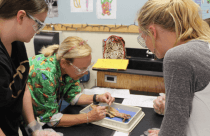4 Crucial Tips on How to Effectively Mentor Graduate Students

What is the Role of a Mentor?
In graduate schools, students often find themselves in need of guidance. This is where mentors play an important role. For example, research mentors can help students develop important skills and knowledge thereby helping them succeed in their coursework or lab work. Furthermore, advisors can also help students understand their roles as students and, in the future, as professionals.
The following sections outline the various ways that mentors play an important role in the lives of graduate students.
Guide Students Towards Their Future Careers
As graduate students work towards completing their degrees, they want to focus on the job market. Therefore, they will have a lot of questions for you. A mentor should show a desire to help students in both their growth as scholars and as professionals.
Here are some areas where mentors can help students:
- Teach them about the job market. Inform them about the important keys to success and the difficulties they might face.
- Provide them with a clear path towards their goals. For example, if a student hopes to become a chemist, be sure to offer a clear outline of the steps the student needs to take to enter the field of chemistry.
- Furthermore, provide them with information on networking opportunities. Introduce them to other faculties or professionals in different fields who might be able to offer more help and guidance.
- Give them information on fellowships and other opportunities to continue their academic development.
Tips for Advisors
Communication is important. Consider that you were once in your students’ position. You know what it was like to take classes, write endless papers, and take exams. So, it is very important that you have open communication with the students that you are mentoring.
Here are some tips:
- Make them feel comfortable whenever they talk to you. Graduates students are under a lot of stress. So, it is important that they know they can confide in you.
- Be sure to talk to students about their performance. They need to know both where they are succeeding and where they need improvements.
- Show that you care. As a mentor, you should show graduate students that you have a clear interest in their work.
- Show an interest in their daily lives. Create an environment where students feel comfortable letting you know about things outside of school. Ask them about their weekend or their summer plans. This can help you gain knowledge about how they are progressing as students and as people.
Things to Avoid Doing as a Mentor to Graduate Students
There are a lot of responsibilities in being a mentor. For some, it can be overwhelming, which could lead to some mistakes being made.
Here are a few things that mentors should not do when helping graduate students:
- Do not compare students to one another. Each student is different. Therefore, a mentor needs to understand these differences and work on treating each student as an individual.
- Do not do the work for students. Students need to be self-sufficient. Instead, guide them and offer them support.
- Do not tailor the student’s studies to your own studies. Let the students follow their own path while you serve as their guide.
Mentoring relationships can take many forms. It can be a relationship between a research advisor and a graduate student. Or, it can be a relationship between a professional guiding a graduate student through an internship. Regardless of the nature of the relationship, a mentor holds many responsibilities, guiding students in their academic, professional, and personal development.









